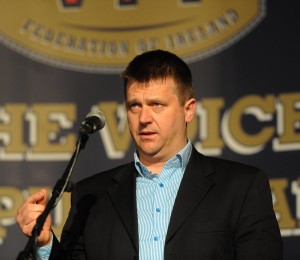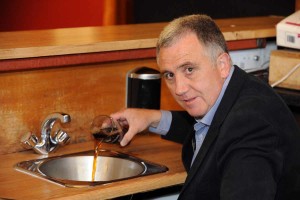42nd VFI Conference AGM
Tourism pubs employ 12k additional Summer staff
New figures compiled by the VFI indicate that the 2,500 pubs in traditional tourist areas employ 12,000 seasonal staff every year during the Summer months.
The significant role of the pub in Irish tourism was one of the themes of the conference.
“There is no doubt that the pub is a central offering to tourists who come to our shores every year and who come back to visit the Irish pub,” stated VFI President Noreen O’Sullivan, “Recent positive CSO figures show a 14% rise in visitor numbers for the first three months of 2015 and we’re hopeful of a busy Summer in traditional tourist areas.
“Publicans have changed their customer offerings, offering a high standard and variety of drinks and craft beers, excellent food, top-class music nights and unique offerings to cater for tourists and their regular Irish customers.
“Every year, Irish pubs employ an estimated 12,000 seasonal staff in the 2,500 tourist pubs alone in this country. This is a significant boost to the Irish economy and Summer 2015 is expected to be the busiest tourist season Ireland has seen in a long time. The pub will be at the centre of this and there’s real potential for even more seasonal jobs to be created.”
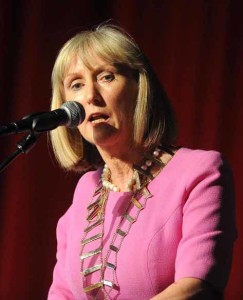
“Recent positive CSO figures show a 14% rise in visitor numbers for the first three months of 2015 and we’re hopeful of a busy Summer in traditional tourist areas” – VFI President Noreen O’Sullivan.
Excise duty a tourism turn-off
The scale of the difference in excise duty between Ireland and its competitors for tourists is simply “unsustainable”, the meeting in Killarney was told.
The Irish pub is a vital part of the tourist experience and the third most-important attraction for tourists – yet vintners are not properly represented on tourist boards and organisations, the meeting heard.
Calling for a reduction in excise, VFI Chief Executive Padraig Cribben said tourists are “turned off” returning here.
“It’s not just that we’ve among the highest levels of excise in the EU – it’s the scale of the difference,” he stated, “We compete with Spain and Portugal, the excise on beer here is 10 times what it is in those countries,”
Wine in Spain and Portugal had no excise duties.
The higher cost of drink here particularly affects repeat business and word-of-mouth business, he said.
“It puts people off from returning,” he told the 400 delegates.
VFI President Noreen O’Sullivan added, “We need to make the country less expensive for tourists. At a time when we’re attracting greater tourist numbers, we need to ensure we’re competitively-priced as well as continuing to offer superb food, service and atmosphere”.
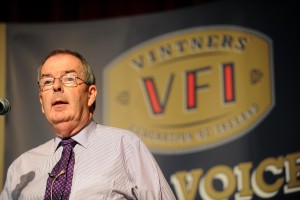
Calling for a reduction in excise, VFI Chief Executive Padraig Cribben said tourists are “turned off” returning here.
Late-night clubs disappearing
Nightclubs and late-night bars are “disappearing” from rural towns, the VFI AGM in Killarney heard.
The downward trend is because of the excessive cost of Special Exemption Orders and publicans are calling for a simpler and cheaper SEO process to be operated by local Gardai rather than the courts.
SEOs now cost €500 per night for pubs and clubs, comprising €410 for the SEO itself plus the legal fees because they had to be moved in the District Courts.
The cost is, in effect, a doubling of the previous charge and was brought in under the last government, the conference was told.
However the increase by then Minister for Justice Dermot Ahern had netted only “a short term gain” . This was because late-night venues were disappearing and jobs were being lost, the conference was told.
“Tourists are arriving in towns and there’s no late bar or nightclub,” Cork VFI’s Michael Farrell said.
The whole process was “cumbersome” as well a expensive and did not allow for flexibility.
A motion to enable local Gardai to issue a limited number of late-night certificates per individual pub for a “nominal fee” for specified occasions was unanimously backed.
Publicans also called for tax incentives to upgrade and extend premises to accommodate guests in rural towns and villages, saying that outside the main cities tourist infrastructure was actually breaking down.
1,200 rural pubs had closed during the economic downturn and together with the closure of post offices, Garda stations and GP’s practices, was actually leading to a shut-down of rural communities.
There were calls too to place the pub at the heart of the local community again. Meetings should be attracted back into pubs, the conference was told.
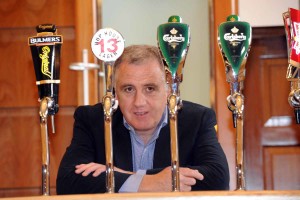
“Tourists are arriving in towns and there’s no late bar or nightclub,” Cork VFI’s Michael Farrell said.
Vast majority of rural Ireland underserved by broadband – VFI President
A lack of broadband in rural areas – defined as anywhere outside Dublin, Cork, Limerick and Galway – is hampering pubs, not least in access to social media and advertising on websites, the VFI conference in Killarney was told.
“There’s a common mistake often made that when we talk about rural Ireland we talk about areas that are far from villages and towns – what might generally be referred to as remote areas,” stated VFI President Noreen O’Sullivan in addressing the conference, “This is a serious misconception.
“Outside of the major urban areas like Dublin, Cork, Limerick, Galway and so on and perhaps one or maybe two towns in each other county, the rest of Ireland is basically rural.
“Villages and small towns rely on rural living and rural infrastructure for their livelihood and prosperity. We can safely assume that the vast majority of the country we live in is rural.”
She continued, “We’ve a responsibility to address the concerns of those in rural areas who feel underserviced and under-supported by existing poor infrastructure, in particular broadband. It’s vitally important we protect the business interests of rural Ireland”.
The Irish pub was vitally important to that rural economy, she said.
Some 64% of VFI pubs supported local suppliers while the pub also supported 7,000 local enterprises.
In addition, the average spend per pub on capital and refurbishment totals €23,000 per annum benefitting local tradesmen, carpenters, electricians and other trades, according to VFI figures.
The VFI also outlined the overall importance of the pub to the Irish economy. Of the 92,000 jobs supported by the drinks industry in Ireland, 52,000 people are employed by the on-trade while the average number of people employed in a pub is seven.
This considerable quantity of jobs results in an estimated wage bill of €1.2billion meaning the Irish pub makes a hefty annual contribution to the exchequer.
The economic benefit of the Irish pub is there for everyone to see, she concluded, “contributing over €20 million in employment-related taxes alone is ample evidence of that. We have also played and continue to play a pivotal role in Irish tourism. Recent research shows that over 80% of tourists use the pub for food and/or entertainment and it is the Number One attraction”.
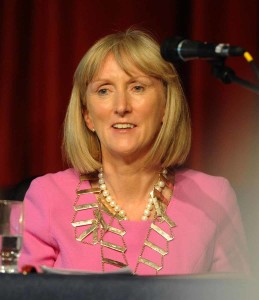
“We can safely assume that the vast majority of the country we live in is rural” – VFI President Noreen O’Sullivan.
On-site microbrewing
Craft beer production and microbrewing are set to increase hugely, but publicans need to tap into the trend, to brew their own beer on-site in their existing pubs if possible, the VFI conference was told.
Microbreweries now numbered around 80 and they’ll reach 300 in just two years.
However few publicans were involved in the trend and they need to “get ahead of the curve”.
Currently though only about one-fifth of those on-site breweries were publicans.
Galway publican Joe Sheridan said he had to go to the US to train as a craft brewer.
The second generation publican from Dunmore said craft brewing was ”a maze of regulations” which had to be gone through, but publicans need to be able to know where to access the appropriate technical training.
“The greatest inhibitor is lack of advice,” he said.
A higher percentage of microbrewers – at least 50% – should be publicans, he said.
The 400-strong- conference supported the call by Galway VFI for the establishment of a technical group to provide advice for microbrewing and on-site brew pubs for existing publicans.
Write-off sought for “dumped beer”
Between €500- and €1,000-worth of beer is being “flushed down the shore” every year by publicans in washing out their beer pipes and the VFI has called for tax refunds or tax write-offs on this wastage, the AGM of the Vintners Federation of Ireland was told in Killarney recently.
The motion by Cork vintners to “open negotiations” with the Revenue Commissioners on this topic was passed unanimously.
Youghal Publican Michael Farrell said that a pub with 10 beer lines washed and dumped as much as seven kegs of beer each year. This was beer on which excise had been paid and between €500 and €1,000 was involved.
“We’re paying excise duty on it and dumping it down the shore,” he said.
The vintners want Revenue to accept a certificate from breweries who’re going to be asked to certify and measure the amount of beer wasted in cleaning each year.
The certificate could be produced by publicans to Revenue to enable them claim a refund on the excise duty or write it off against tax.
Pop-up pubs need to be tackled
Publicans have called for greater regulation and “a level playing pitch” in regard to so-called “pop-up” pubs. Instant pubs were being set-up in back-gardens, beaches and playing fields etc to cater for parties in what’s a growing business along the west and northwest coast the annual VFI AGM in Killarney was told.
This was business that was being lost from rate-paying publicans and it needed to be regulated.
A motion from Donegal Vintners called on the VFI to take action to ensure the relevant licensing laws were being complied with and it was passed unanimously.
“Tent-like structures are being put up and drink brought in from the off-licence,” the meeting was told.
Donegal VFI’s Alice Lynch said, “the pub brand” was being used – but pubs were “getting no benefits”. Planning laws for the mobile units should also be looked into, she urged her Executive.
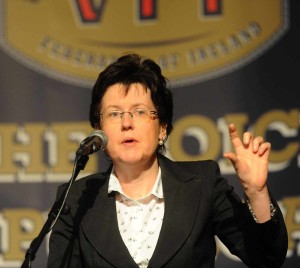
Donegal VFI’s Alice Lynch said, “the pub brand” was being used – but pubs were “getting no benefits”.
Good Friday disappointment
In his annual review to Conference VFI Secretary and Waterford publican Michael Fitzgerald stated that the VFI was “very disappointed” with Minister Frances Fitzgerald’s response to its campaign to allow pubs serve alcohol on Good Friday.
The Minister had “no real appetite” for Good Friday opening, he stated.
“We thought we had a good chance,” he said. Losing business at Easter was very hard – and tourists had no place to go on Good Friday – “a day you can get a drink in the Vatican!” he emphasised.
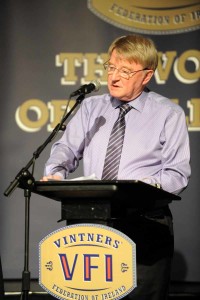
Donegal VFI’s Alice Lynch said, “the pub brand” was being used – but pubs were “getting no benefits”.
VFI seeks level playing pitch for self-employed
At its Killarney AGM the VFI called for greater supports and “equality” for the self-employed.
There was a huge sense among its 4,000 members that the self-employed were severely disadvantaged.
During the downturn in rural areas alone 1,200 pubs had shut down.
“There is a huge sense on the ground amongst our members, that self-employed and business owners are significantly disadvantaged compared to other sectors when it comes to State supports when their businesses fail,” stated VFI President Noreen O’Sullivan, “We’re actively seeking a more equitable approach to such supports for our members.”
In the pub and wider hospitality sector business owners collect VAT, PRSI and other taxes and pass them on to Government.
They also pay PRSI on behalf of anybody that they employ. The self-employed “took all the risks” but when their ventures failed they had none of the supports of their employees.
“We pay that PRSI so that those employees can have access to various State benefits, many of which we are precluded from,” said Noreen O’Sullivan.
The long hours and business worries were not factored in by the State – particularly the stresses associated with struggling family-owned businesses.
“What’s regrettable is that when businesses fail the level of support for those who’ve taken the risks, for those that have collected the taxes, for those that have created the employment, for those who’ve endured the sleepless nights, there is very limited support from the State.
“There’s great talk about equality and this is one area where equality certainly does not exist,” she told conference, “We need to ensure that Government creates a level playing field to support those whose businesses have fallen on hard times and for whom access to State supports is virtually a no-no.”
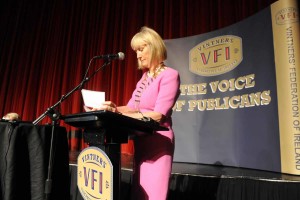
“We pay that PRSI so that those employees can have access to various State benefits, many of which we are precluded from” – Noreen O’Sullivan.



